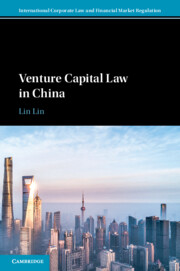Book contents
- Venture Capital Law in China
- Cambridge University Press
- Venture Capital Law in China
- Copyright page
- Dedication
- Contents
- Figures
- Tables
- Preface and Acknowledgements
- Abbreviations
- 1 An Introduction to the Venture Capital Market in China
- 2 Venture Capital Fundraising
- 3 Venture Capital Investing
- 4 Venture Capital Exits
- 5 Lessons from China and Ways Forward
- Appendix List of Chinese Legislation
- Index
4 - Venture Capital Exits
Published online by Cambridge University Press: 09 February 2021
- Venture Capital Law in China
- Cambridge University Press
- Venture Capital Law in China
- Copyright page
- Dedication
- Contents
- Figures
- Tables
- Preface and Acknowledgements
- Abbreviations
- 1 An Introduction to the Venture Capital Market in China
- 2 Venture Capital Fundraising
- 3 Venture Capital Investing
- 4 Venture Capital Exits
- 5 Lessons from China and Ways Forward
- Appendix List of Chinese Legislation
- Index
Summary
The literature dealing with the law of venture capital (VC) has primarily dealt with the following three areas: government intervention and the development of VC markets; VC contracting; and VC exits, the last of which is particularly pertinent to the present chapter. As a preliminary point, five principal VC exit vehicles have been identified by scholars: (1) an initial public offering (IPO), in which a significant portion of the portfolio company is sold in the public market; (2) an acquisition exit, in which the entire firm is sold to a third party (through a sale of shares, merger, or sale of the firm’s assets); (3) a secondary sale, in which only the venture capitalist’s shares are sold to a third party (typically a strategic acquirer); (4) a buyback, in which the venture capitalist’s shares are purchased by the entrepreneurial firm itself; and (5) a write-off, in which the venture capitalist walks away from the investment. Venture capitalists and entrepreneurs are free to choose the appropriate exit strategy based on their business needs, the firm’s financial condition, and market conditions. Each form of exit has its corresponding advantages and disadvantages, such that a choice of one over another must be made according to an assessment of the particular circumstances in which the deal is made.
Keywords
- Type
- Chapter
- Information
- Venture Capital Law in China , pp. 213 - 304Publisher: Cambridge University PressPrint publication year: 2021

